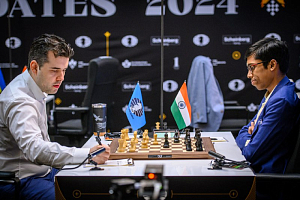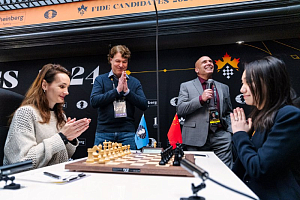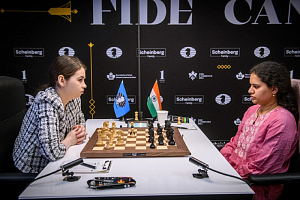An Artist and a Time Trouble
Round Four of the Candidates Tournament in Berlin. Report by Vladimir Barsky
In my report about the Candidates tournament opening in Berlin I have already mentioned Vladimir Kramnik’s being asked at the kickoff press conference whether he was going to take on the role of a pragmatic or an artistic player there. The former world champion smiled:
– In a recent Wijk aan Zee tournament I was going to play solid and practical chess, but instead many of my games saw fire on board, with evaluation ranging from "winning" to "losing"... I would like spectators to see Kramnik the pragmatist in Berlin, but I'm afraid you are more likely to see Kramnik the artist!
It has turned out as though he saw it in a crystal ball. Prior to round four game with Fabiano Caruana, Vladimir was the sole leader, and he had the white color to be in charge of. The plan of actions suggested itself: to set up a solid position and try to put as much pressure on the opponent’s position as possible, and if Black wants to play for a win, he will then have to take great risks. At first, the events developed exactly to this scenario, and Caruana showed not minding a draw by opting for a bullet-proof Petroff Defense, rather than, say, the Najdorf. Soon, the queens were traded off, and an approximately equal, boring-looking position appeared on the board. Internet was brimming with ironic and patronizing comments. They alleged that Kramnik decided to render the game as dry as possible, which was not very nice, of course, but that following a brilliant start and an enterprising victory over Aronian, he was entitled to a respite after all.
Several moves later it became clear that the leader was nowhere near relishing the prospect of the upcoming rest day. Kramnik came up with an original plan to press in the center, but it was somewhat slow: while White was busy mobilizing his pieces into the battlefield, Black was given time to force a sortie on the kingside. In response, the former world champion struck on the opposite side of the board, upon which great complications ensued with mutual infiltration of pieces and pawns into opponents’ camps. Kramnik admitted to having missed 28... Rad8! in his advanced calculations, which passed advantage over to Black.
Kramnik – Caruana

19. c4?!
It is somewhat weird to see a move like that performed by Kramnik. It looks like something went wrong, but he was unwilling to put up with that. A precise 19. f3 gives a rough equality, but a small edge is already with Black.
19... g4 20. Ne4 Bxe4 21. Rxe4 Bg5+ 22. Kb1 gxh3 23. c5!?
This is the crux of White’s whole plan. In the case of 23. gxh3 f5 24. Re2 f4 both bishops produce a weird impression. On the other hand, 23. Bxe5+ dxe5 24. gxh3 Rad8 has a tough defense in store for White.
23... f5! 24. Rb4 hxg2 25. Rxb7+ Kh8!
A chicken-hearted 25... Re7 allows White to get away with it after 26. Rxe7+ Bxe7 27. Rg1.
26. cxd6 Nf3 27. Ba4 Nxh2 28. Bxc6

28…Rad8!
A very annoying intermezzo move. 29. Bxe8 now fails to 29…Rxd6 30. Rd7 (or 30. Rg1 Nf3) 30... Rxd7 31. Bxd7 Nf1, compelling White to give up a piece to continue fighting.
However, Caruana walked into a big time trouble and committed several inaccuracies, which rendered his position critical.
29. d7 Re2 30. Bxg2 Rxf2 31. Bc6 Ng4 32. Rxa7 Ne3 33. Rg1 h6 34. Rc7 Kg7 35. a4 Kf7 36. Bb5 Ke7 37. a5 Rf4 38. c3 Kd6 39. Rb7 Rg4 40. Re1 f4 41. a6 h5 42. a7 Ra8

Kramnik had a clear-cut path to victory, which he failed to find out, though: 43. c4! Rg2 44. c5+ Kxc5 45. Rc1+ Kd4 46. Bc6, etc. Caruana intended to block the c-pawn: 43... Kc5, which runs into 44. b4+ Kd4. Vladimir seems to have cut off his calculations here, unhappy about the opponent’s king becoming too active. However, a not too complicated 45. Bc6 h4 46. d8Q+! Bxd8 47. Rd7+ gives White a decisive advantage.
Vladimir decided to win in a more simple way without giving his opponent any counterplay, and ended up miscalculating.
43. b4 h4 44. c4 h3 45. c5+ Ke5 46. Rb8 Rxa7 47. Rg8

47…Bf6!
Kramnik believed that he was winning an exchange and keeping all advantages of his situation (his dangerous passers first and foremost), overlooking the fact that his king suddenly falls into a mating net: 48. Rxg4? Kf5! White had to part ways with his trump, the d7-pawn, which made the position even - this is what is claimed by the engine that knows no errors when it comes to positions subject to calculation.
Kramnik continued playing for a win out or enertia, and his king landed into precarious position. Besides, Vladimir was very short on time, and Fabiano skillfully maintained pressure and kept creating new threats all the time.
48. d8Q Bxd8 49. Rxg4 Bf6 50. Rg6 Rb7 51. Be2 Rxb4+ 52. Ka2 Nc2 53. Rc1 Nd4 54. Bd3 Ra4+ 55. Kb1 Nb3!
Vladimir believed that Black was about to seal a draw with 55... Rb4+ 56. Ka2, but Fabiano, having a great deal more time over his opponent, is playing for a win already.
56. Re1+ Kd5 57. Kc2
It was high time that White forced a draw: 57. Rxf6 Ra1+ 58. Kc2 Rxe1 59. Kxb3 h2 60. Bc4+ Kxc5 61. Rf5+ Kd4 62. Rxf4+ Ke3 63. Rh4, etc.
57... Nd4+ 58. Kb1
Stronger is 58. Kc1!, so as to interpose the check along the first rank with Bb1.
58... Nf3!
Knight jumps are very unpleasant, especially when you lack time to think them over.

59. Rd1??
White commits a blunder with only two seconds on his clock. “I panicked and made the first move that crossed my mind,” admitted the ex-world champion.
A draw was still not out of reach: 59. Rxf6 Nxe1 60. Bf1 h2 61. Rh6.
59... Ra1+ 60. Kc2 Rxd1 61. Ba6
In the case of 61. Kxd1 h2 62. Rh6 Bh4 the black pawn cannot be stopped from queening.
61... Rd2+ 62. Kc1 Bb2+ 63. Kb1 Kxc5 64. Bb7 Ne5 65. Rf6 f3 66. Rf5 f2 This is when Kramnik recognized his defeat, and Caruana has taken over in the lead of the tournament race. The dramatic game lasted almost six and a half hours.
Shakhriyar Mamedyarov and Wesley So were earlier than others to call it a day: in one of the topical lines of the Nimzo-Indian Defence Black solved his opening problems with precise play and achieved a draw.
– I have played a fantastic game and did all the best moves, Shah smiled slyly at the press conference. – It was still not sufficient to score. Playing in the previous round against Caruana, I always believed my position to be better, refusing a draw by repetition for that reason. I came home and went through the game on my computer: it turned out I had been worse throughout the entire game, and when I refused from repeating moves the evaluation was plus one in favor of my opponent!
Talking about the opening stage, Shah made reference to the game Bareev - Ivanchuk. Wesley looked at him in surprise and asked to clarify who and when had played like this. Shah smiled: "It was a long time ago, you were not born yet!" Actually, the game was played 12 years ago at the Capablanca Memorial in Cuba, but Wesley So does not seem to take too much interest in creative achievements of his predecessors.
The game of Sergey Karjakin and Levon Aronian can add to the subject "In the Footsteps of Opening Catastrophes", which in modern interpretation should rather be titled: "I messed up everything despite learning hard." The sharp Vienna, which the grandmasters handled the opening into, leaves no room for errors. Karjakin sacrificed a pawn, hoping to get serious initiative in exchange, and after his next mistake on move 17 he was forced to switch to the fight for equality. However, Sergey failed to bail out - so bad was his position out of the opening.
Karjakin – Aronian
1. d4 Nf6 2. c4 e6 3. Nf3 d5 4. Nc3 Bb4 5. Bg5 dxc4 6. e4 c5 7. Bxc4 cxd4 8. Nxd4 Bxc3+ 9. bxc3 Qa5 10. Bb5+ Nbd7 11. Bxf6 Qxc3+ 12. Kf1 gxf6 13. h4 Qb4

14. Rb1
After 14. Rh3 a6 15. Be2 Ne5 16. Rb1 Qd6 there would have arisen a position from the So – Aronian game, Wijk aan Zee 2017, which Karjakin was obviously willing to get. Why did he change the move order? Aronian suggested that 14.Rh3 was probably not to White’s liking because of 14...e5, but a simple 15.Nf5 gives an indirect protection to the b5-bishop. All in all, only Sergey is capable of explaining what went wrong.
14... Qd6 15. Rh3 a6 16. Be2 Nc5!

As the knight changes destination, opting for c5 rather than e5, White’s position becomes immediately unsatisfactory - he is down a pawn already, the second one is en prise and no compensation is visible.
Black’s conversion was not perfect, but he did not let go of his chance. The computer shows a clearer path to victory by cutting off the white king's escape to the flank and attacking it in the center. Your correspondent asked Aronian if he had put such ideas to consideration.
"Yes, I did," replied Levon, "but failed to find a forced win there. I thought that playing too adventurously would lead nowhere because Sergey is known to be a good defender. Therefore, it was best to act reliably. It seemed to me that the game continuation allowed Black to keep everything under control.
The question of how he spent the rest day to get over the painful defeat from Kramnik was given the following answer by Aronian:
– I visited my parents (they live in Berlin - Ed.), and we played Scrabble. After a tense fight, he defeated his mother by a mere difference of 7 points!
Sometimes it is very important to put chess to oblivion and score a victory elsewhere!
An enterprising opening duel in the anti-Moscow gambit was seen in the game between Alexander Grischuk and Ding Liren. White sacrificed a piece, which Veselin Topalov had introduced into practice 10 years ago against his historical rival Vladimir Kramnik. White then scored an effective victory, but Black seems to have found sufficient defensive resources. This evaluation prevailed almost until the end of 2017, but then it changed.
– I was inspired by the game of Alfa-Zero’s, which gives high evaluation of White’s chances, while Stockfish and Komodo fail to grasp this, - shared Alexander Grischuk. As for Ding Liren, he was apparently unaware of the latest top-notch computer achievements, patiently sitting there and calculating lines. As a result, Black made a mistake on move 21, upon which Grischuk could have tipped the scales in his favor.
Grischuk – Ding Liren

22. Bh4+! Bf6 23. Qg4 Qxd4 (neither Black is helped out by 23... Rhg8 24. exf6+ Kxd6 25. Qxf4+ e5 26. dxe5+ Nxe5 27. Rfe1) 24. Bxf6+ Nxf6 25. Qg7+ Kd8 26. exf6 Qxf6 27. Nb7+ Bxb7 28. Qxb7, with a checkmate.
Alexander missed this opportunity; it was shown at a press conference by the Chinese grandmaster, who discovered it immediately after committing a blunder (such retarded enlightenments happen in chess all the time). White played 22. Rxf4, and in the subsequent sharp struggle the offensive and defensive balanced each other out.
Individual standings: 1st. F. Caruana - with 3 out of 4; 2-3. V. Kramnik, S. Mamedyarov - with 2.5; 4-6. L. Aronian, A. Grischuk, Ding Liren - with 2; 7-8. S. Karjakin, W. So - with 1 point each.
Round five is scheduled on Thursday, March 15, and features the following pairings: Aronian-Grischuk, Caruana-Karjakin, So-Kramnik, Ding Liren-Mamedyarov





















